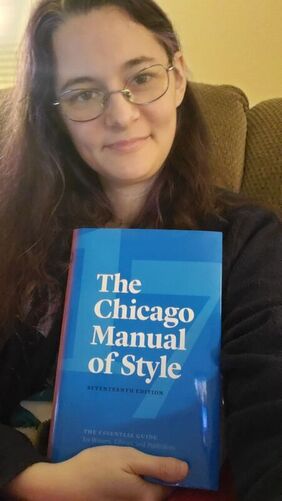|
4/23/2022 0 Comments HyphensWhat would English grammar be without exceptions? Apparently nothing, because the rules for the correct use of hyphens include exceptions! Rules for compound adverb/adjective modifiers: 1. The two-word modifier comes before the noun (just like in this sentence!). 2. Both words function together to modify the noun. The hot, red car was fast. Hot car. Red car. But the red-hot car was fast. Red almost is like an adverb describing hot in that sentence! 3. Speaking of adverbs, when the first of the two words ends in -ly, no hyphen is needed. Observe: I am a heavily praised editor. (It's just an example sentence. I promise! 😂) Rules for compound adjectives or nouns: 1. Good luck. 2. Just kidding. There really are rules. And then exceptions. And then rules to those exceptions. Some options to figuring these out are to look it up in the dictionary or ask your editor, who will probably look it up in her Chicago Manual of Style (or in her dictionary). 3. Some examples: out-of-date package, state-of-the-art swimming pool, free-for-all buffet. (The rule is, most of the time, hyphenate. But sometimes don't.) Rules for prefixes and suffixes:
1. (Almost) always use a hyphen with self-, ex-, and all- and -elect, -style, -based, and -free. 2. Use a hyphen when the prefix ends with the same first letter as the word, like re-elect. (Also applies to suffixes that begin with the same last letter as the word.) 3. Use a hyphen when your noun is proper (capitalized). Rules for numbers: 1. Spelled-out fractions always get a hyphen. 2. Spelled-out numbers (from twenty-one to ninety-nine) get a hyphen. 3. There are exceptions to this, so when in doubt, use a hyphen and let your editor angst over it. Rules to avoid confusion: 1. Use a hyphen to avoid confusion. (Aren't you glad I explained this one?!) 2. I re-signed the client. I resigned the client. Two totally different meanings! The English language has a lot of these. Usually when your words need a hyphen, they will follow another of these rules, like large-corporation policies (where the corporation is large--a two-word compound adjective) vs. large corporation policies (where the policies are large). Other rules: 1. There are some, and they have exceptions. 2. Ask your editor so you don't have to stress over it! 3. These will probably be dealt with on a case-by-case basis, so it's impossible to list every single instance of when a hyphen should be used. 4. However, here's one: a two-word noun that does not use a hyphen (like, "She gave me a high five." or, "My favorite game is ping pong.") will need one when it's used as a verb (like, "The girls high-five each other in celebration." or, "The argument ping-ponged across the room."). Next week, the difference between a hyphen and a dash! 🤪
0 Comments
Leave a Reply. |
Archives |
Proudly powered by Weebly


